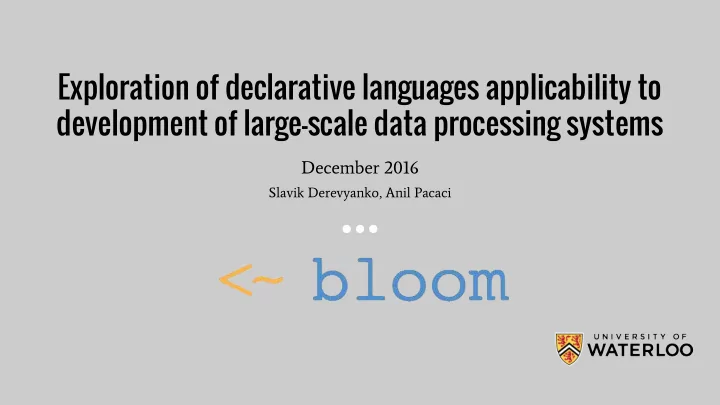

Exploration of declarative languages applicability to development of large-scale data processing systems December 2016 Slavik Derevyanko, Anil Pacaci
Declarative languages for distributed systems A research group at UC Berkeley lead by Prof. Hellerstein: ● claims that the problems with distributed software come from the usage of imperative ○ sequential programming languages to describe systems that are inherently non-sequential resulting systems tend to be much smaller: 20KLOC / 1KLOC for HDFS ○ Related PhD theses we’ve studied in this class: ● ○ Peter Alvaro: Data-centric Programming for Distributed Systems, 2015 ○ Peter Bailis: Coordination Avoidance in Distributed Databases, 2015. I-Confluence Overview 2 / 17
Project goals Decided to verify claims on applicability of declarative logic programming for ● development of distributed software systems Decided to build one of the distributed data processing models presented in class ● Decided to implement Google’s Pregel, as a simple synchronous model for ● parallel computation based on Valiant’s Bulk Synchronous Parallel BSP model To test correctness of our Pregel model - implemented PageRank on top of it ● Overview 3 / 17
Bloom Bud declarative framework All data is represented as collections of facts (or tables containing records) ● New facts can be derived by declaring transformational rules ● No shared state: nodes exchange data as network messages (Overlog) ● Introduction of notion of time - data collections evolve over time (Dedalus) ● Overview 4 / 17
Building Pregel using Bud Bloom declarative framework
Pregel distributed graph processing model Pregel implementation 6 / 17
Master node superstep coordination Pregel implementation 7 / 17
Worker node superstep processing Pregel implementation 8 / 17
PageRank implementation Pregel implementation 9 / 17
Comparing declarative and imperative programming
Advantages - less code Bud Experience 11 / 17
Troubles, limitations Bud Experience 12 / 17
Demo
PageRank by matrix multiplication 14 / 17
TCP network communication (instead of UDP) 16 / 17
Recommend
More recommend